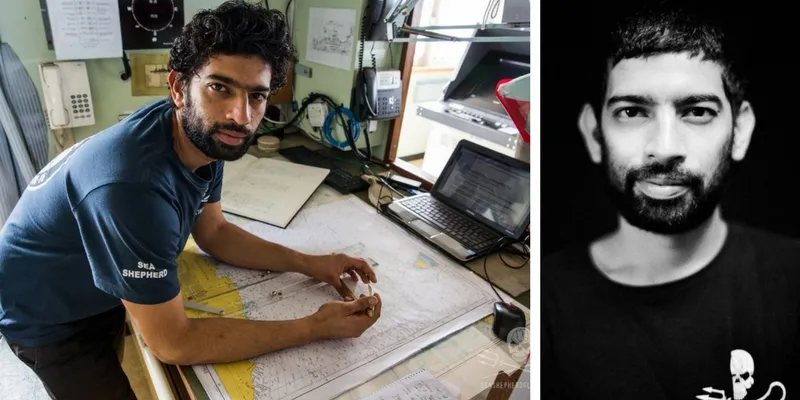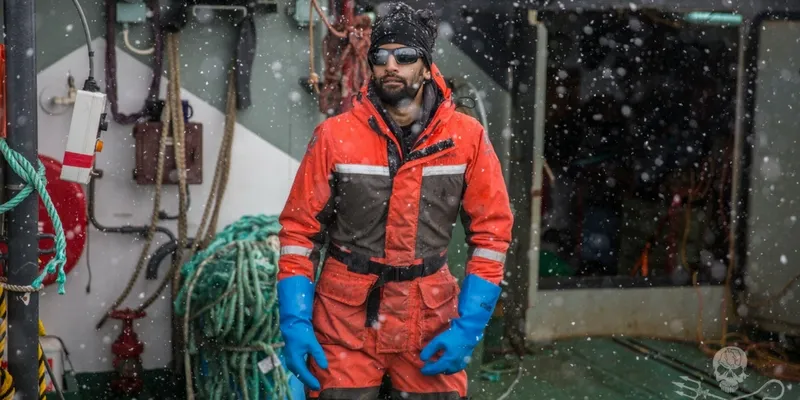Meet Siddharth Chakravarty, the man who has been on the frontline of efforts to promote marine conservation
Siddharth, who was a seaman himself, gave up sailing when he realised the amount of damage commercial vessels bring to the sea and the life it holds.
The seas and oceans are as much a critical part of the ecosystem as land and play a crucial role in the sustenance of the generations to come. The rapid exploitation of resources and the mindless extraction and fishing that is going on at the sea today gives us a picture of the grave situation. Here’s Siddharth Chakravarty, a man who has been fighting for marine conservation, giving an insight into the urgency of the situation through his journey.

A conscious decision to protect the environment
Thirty-three-year-old Siddharth joined the merchant navy in early 2001 and after working on commercial ships for 10 years quit in 2011. This decision, he says, was a very conscious one, after having understood the harm various violations on the sea cause to the environment.
“I used to work on chemical tankers that carry acids and other dangerous chemicals. It was in 2009 that I made a conscious decision to separate myself from the merchant navy. It was the 25th anniversary of the Bhopal gas tragedy, and I was born in Bhopal. When the tragedy happened, I was there in Bhopal as a kid and I was carrying a similar cargo. At that point, I realised I did not want to work commercially on ships where I had no control where my revenue came from,” says Siddharth.
The bigger issue that bothered Siddharth was the violations that were harming the environment. The sheer increase in the number of vessels that have to undergo regular cleaning after carrying each cargo was itself causing a greater damage to the sea. “For me, the bigger violations were the rules that were set by International Maritime Organisation were outdated, and not in keeping with the increase in the number of vessels. The number of vessels had increased a lot but the pollution criteria had remained the same,” says Siddharth.
Siddharth points out the amount of pollution that is being caused because of the chemicals that are going into the water when the tanks are being cleaned and the chemicals are dumped into the water. Siddharth cites the recent Chennai oil spill as a perfect example of such a violation. There are either lapses while carrying the cargo, or collisions, which are violations that cause huge damage to the local ecosystems.

From commercial ships to saving whales
Although that’s when he decided to quit, it took Siddharth two years to move on. He quit in 2011 with the specific purpose to join Sea Shepherd Conservation Society, a non-profit marine conservation organisation based in the United States. He has been part of eight campaigns with them, three of which were actively involved in the defending of whales, and five were fisheries campaigns in the Pacific, the Indian Ocean, the Mediterranean Sea, and Antarctica.
“The last campaign was in the Indian Ocean, where we identified that a fleet of Chinese vessels was fishing with banned fishing gears. These vessels were using drift nets, which are causing a lot of damage to sea life. It is important that we stop the damage right when we show up,” Siddharth explains.
The impact of the campaigns has been far reaching and has created a momentum for other international actors to take this precedence and start acting. For instance, of the three whaling campaigns Siddharth has been a part of, of the 3,100 whales, about 70 percent were saved because of the team’s intervention.
The campaigns by Sea Shepherd Conservation Society have also been able to work in cooperation with the Chinese government, something that is unprecedented. Under Operation Driftnet, the operations of six illegal fishing vessels were ended. The Chinese government responded by temporarily suspending the fishing licences of all of the vessels owned by the company, revoking the certification of the captains on the vessels and fining them an equivalent of $300,000.
“It’s not just the six vessels; it’s also a foot in the door for China in international cooperation and fighting illegality on the oceans,” Siddharth notes.

A human rights mission
Siddharth, who quit Sea Shepherd Conservation Society in May 2016, is currently working on independent research and is setting up a programme that looks at the movement of labour on the ships. He is looking at the fishing industry and the crew of international fisheries from the human right and social justice perspective.
“I find that human rights abuse is the root cause of the problem. There’s exploitation of people, which has led to the exploitation of the oceans. Many people, especially in the Southeast Asia, who are often desperate to find work, find themselves working for almost 21 hours, in harsh working conditions, enduring physical abuse, exploitation and bad living conditions,” he says.
This, Siddharth adds, has created a pool of migrant fishermen who are very vulnerable in international waters, and have no access to human rights and wage rights. Siddharth’s mission is to tackle these rights to tackle the problem of overfishing.
Unless there’s a drop in the number of vessels on the sea, there’s no way one can tackle the ocean’s health, says Siddharth.







